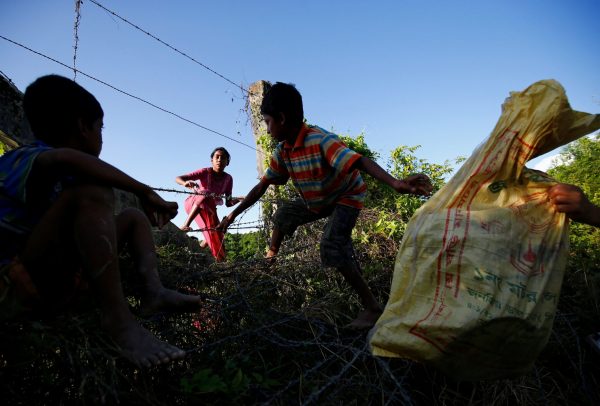Bangladesh shares a 4096-kilometre border with India, the fifth longest land border in the world. Bangladesh’s only other neighbour is Myanmar with which it shares a 271-kilometre south-eastern border. The Bay of Bengal makes up Bangladesh’s southern border, a frontier that is watched over by the powerful navy of its big western neighbour — India.
The current Awami League (AL) government headed by Prime Minister Sheikh Hasina has departed from Dhaka’s previous approach towards New Delhi, adopting an India-positive foreign and security policy in order to build a long-term, stable bilateral relationship. Since AL assumed power in 2009, Bangladesh and India have cooperated on matters pertaining to security and counter-terrorism. The two countries have worked to resolve the outstanding land and maritime boundary issues that have dogged relations for years. Bangladesh and India have also made significant progress on trade, investment, communication and defence during this period.
At the same time, Bangladesh has strengthened ties with China. Chinese President Xi Jinping’s visit to Dhaka in September 2016 was the first by a Chinese president to Bangladesh in three decades. It resulted in a series of deals worth a total of US$13.6 billion, covering issues including communication, infrastructure, energy and counter-terrorism. Defence ties between Bangladesh and China are also robust with Bangladesh accounting for 20 per cent of all Chinese arms exports, becoming its second largest buyer in recent years.
China also considers Bangladesh to be an important player in implementing its Belt and Road Initiative. Xi’s trip was perceived as a diplomatic move to ensure Dhaka does not wander down a different path. Hasina has adroitly played her cards, effectively balancing ties with China and India in order to reap the benefits of both relationships. While this delicate balancing act has been a success for the incumbent administration, it remains to be seen if Bangladesh can continue to tread carefully between the two powerhouses.
While Bangladesh has been able to balance its relations with the two regional powers, the Rohingya issue in Myanmar continues to bedevil its relations with Myanmar. Thousands of Rohingyas have crossed into Bangladesh and sought refuge as they are an ethnic minority group denied citizenship in Myanmar. Myanmar’s authorities allege that the Muslim Rohingyas of Rakhine are illegal Bangladeshi immigrants who have ties with radical groups. Bangladesh has consistently denied such claims and even launched raids in Rakhine, a remote and poorly policed area, to flush out extremists. The Bangladeshi government has also voiced concerns about the flow of illicit drugs and weapons from Myanmar into Bangladesh.
Despite the presence of vexing issues, in 2012 Bangladesh and Myanmar were able to peacefully resolve a decades-long dispute over the maritime boundary, which shows the potential for the relationship to strengthen. As Myanmar opens up, the prospects of cross-border trade and a transit route to China adds a sense of urgency for Bangladesh to take advantage of this burgeoning relationship and ensure its long-term security and economic goals.
Geography has not put Bangladesh in an enviable position. Yet many years after its independence, Bangladesh has the opportunity to leverage its location to benefit from visions of trade and connectivity. While it is not possible to change one’s geographical position, pragmatic and visionary policies may turn Bangladesh’s locational reality into a ‘geographical gift’.
Rashed Uz Zaman is Professor in the Department of International Relations, University of Dhaka.

